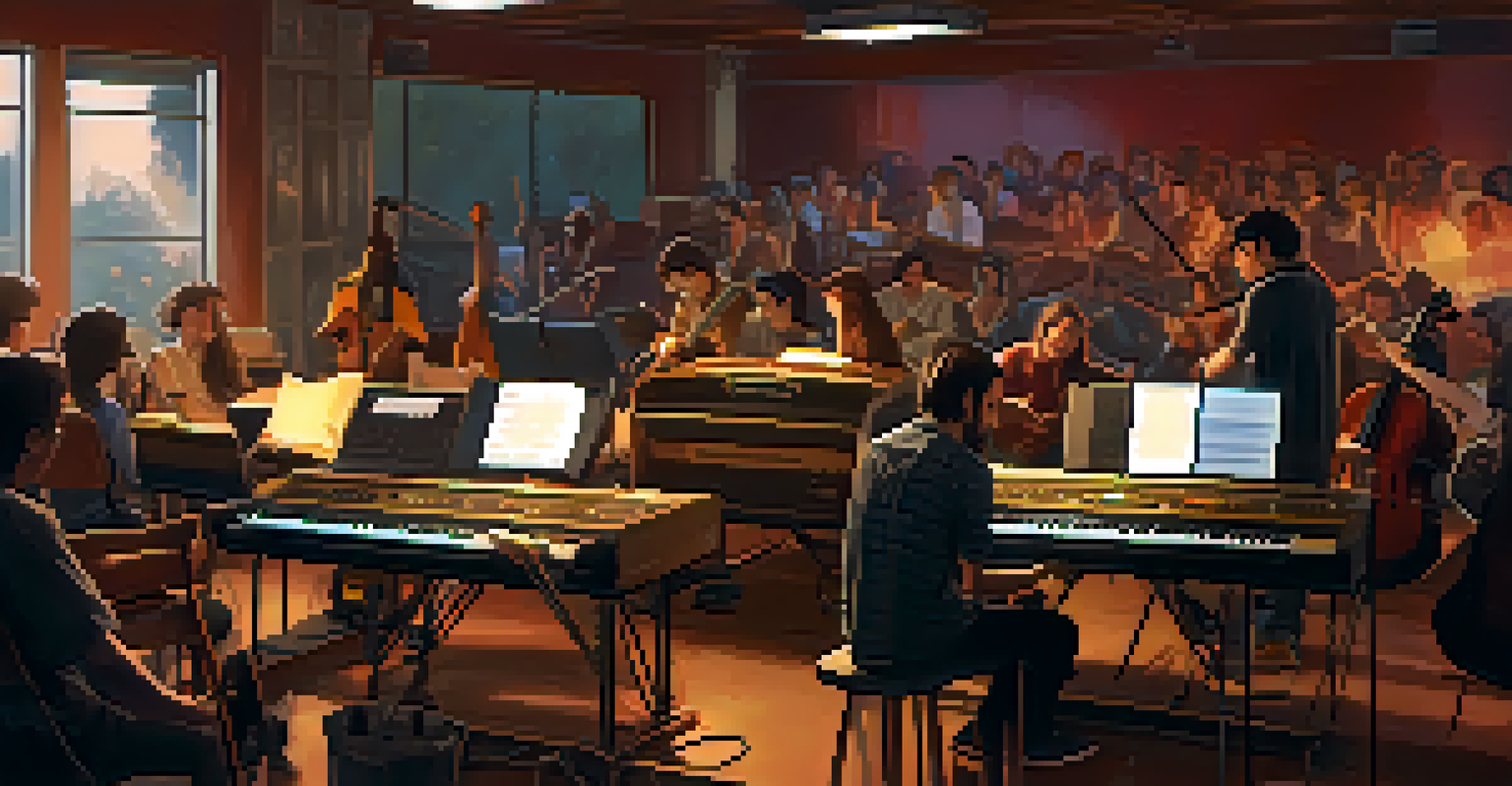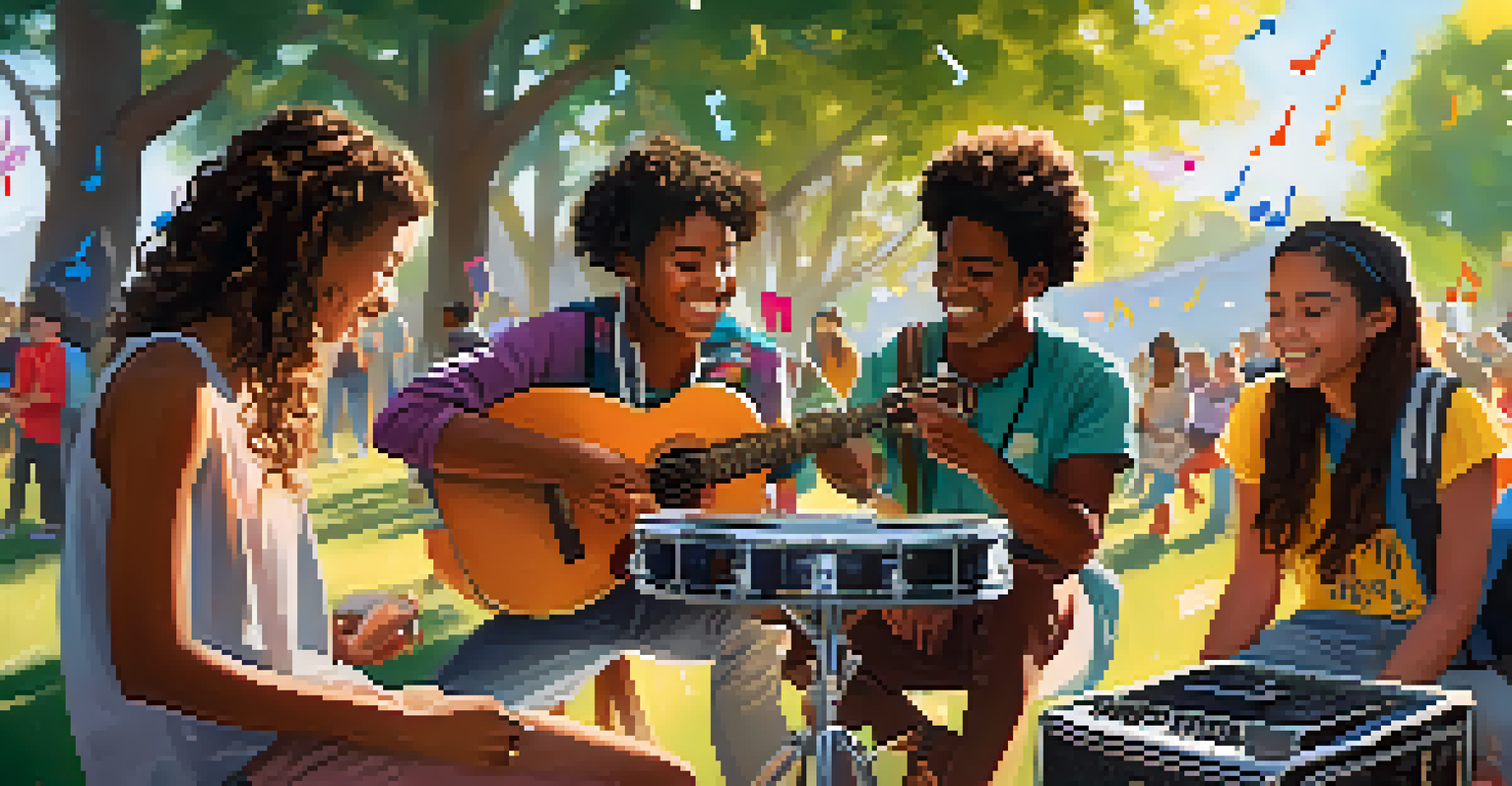How Austin's Music Festivals Support Local Education Programs

The Heartbeat of Austin: Music Festivals and Education
Austin is known as the Live Music Capital of the World, and its vibrant music festivals play a pivotal role in the community. These events not only celebrate musical talent but also serve as platforms for supporting local education programs. By aligning music with education, these festivals create meaningful opportunities for growth and learning among young people.
Music can change the world because it can change people.
For instance, festivals like South by Southwest (SXSW) and Austin City Limits (ACL) have been known to allocate portions of their proceeds to local schools and educational initiatives. This financial support helps provide resources such as musical instruments, technology, and scholarships for aspiring musicians. It’s a win-win situation that underscores the community's commitment to nurturing future talent.
Moreover, these festivals often include educational workshops and panels featuring industry professionals. This provides students and local artists with insights into the music business, fostering a new generation of skilled individuals who are passionate about their craft.
Community Engagement: Bridging Gaps Through Music
Community engagement is at the core of Austin's music festivals, and this extends to educational outreach. Organizers often collaborate with local schools to offer programs that connect students with musicians and industry experts. These interactions not only inspire students but also create a sense of belonging and support within the community.

Events such as the Austin Reggae Festival have been known to feature local students performing on stage, giving them a unique opportunity to showcase their talents. This exposure can lead to increased confidence and motivation, encouraging students to pursue their musical passions. In turn, this enriches the local music scene and promotes a culture of creativity.
Music Festivals Support Education
Austin's music festivals, like SXSW and ACL, allocate funds to local schools, enhancing resources and opportunities for aspiring musicians.
Furthermore, many festivals also include volunteer opportunities for students, allowing them to gain hands-on experience while contributing to a cause they care about. This fosters a sense of responsibility and community pride, essential elements in the holistic development of young individuals.
Sponsorships and Partnerships: Fueling Educational Growth
Sponsorships from local businesses and organizations play a significant role in the success of Austin's music festivals. Many of these sponsors are committed to giving back to the community, especially in the realm of education. By partnering with music festivals, they help fund various educational initiatives that might otherwise lack resources.
The arts are not a luxury. They are a necessity, and they are an opportunity.
For example, some festivals have established scholarship funds specifically for students pursuing careers in the arts. These scholarships can make a substantial difference in a student’s life, alleviating financial burdens and opening doors to higher education opportunities. It's a testament to how collaboration can lead to impactful results.
Additionally, these partnerships often lead to mentorship programs where students can connect with seasoned professionals. This invaluable guidance can help them navigate their career paths, making education not just accessible but also practical and relevant to the real world.
The Ripple Effect: Lasting Impacts on Local Schools
The influence of music festivals on local education goes beyond immediate financial contributions. The resources provided often lead to lasting changes within schools, enhancing their music programs and overall educational offerings. Schools that receive support can invest in better facilities and qualified instructors, creating an enriched learning environment.
Moreover, as students engage in music and arts education, they often experience improvements in academic performance and social skills. Studies show that students involved in musical activities tend to develop better focus, discipline, and collaboration skills. This holistic development can empower them in various aspects of life, making the case for continued support for these programs.
Community Engagement Drives Growth
Through collaborations with schools, music festivals inspire students by connecting them with industry professionals and providing performance opportunities.
As these students grow and succeed, they often return to their communities, contributing back to the cycle of support. This creates a flourishing environment where education and the arts are prioritized, motivating future generations to pursue their passions.
Fostering Diversity: Inclusion in Music Education
Austin's music festivals also play a crucial role in promoting diversity and inclusion within the educational landscape. Many festivals actively seek to represent underrepresented groups in their programming and outreach initiatives. This commitment ensures that all students, regardless of their background, have access to quality music education.
By incorporating diverse musical styles and traditions, these festivals help students appreciate a variety of cultural perspectives. This exposure not only enriches their musical knowledge but also fosters empathy and understanding among peers. In a city as diverse as Austin, this inclusivity is vital for building a cohesive community.
Additionally, scholarships and programs targeting marginalized groups help level the playing field. This ensures that talented students from all walks of life can pursue their passion for music, ultimately contributing to a richer, more vibrant arts scene.
Creative Collaborations: Artists and Educators Unite
The collaboration between artists and educators during music festivals is another powerful aspect of supporting local education. Many festivals invite educators to lead workshops and discussions, allowing them to share their expertise with young musicians. This creates an enriching environment where creativity thrives.
These collaborations can take many forms, from masterclasses led by renowned artists to interactive sessions where students can perform and receive feedback. Such experiences are invaluable, as they provide students with insights and inspiration that can shape their artistic journeys. It’s about creating connections that last beyond the festival.
Diversity in Music Education Matters
Austin's festivals actively promote diversity, ensuring that underrepresented groups have access to music education and enriching the local arts scene.
Furthermore, these interactions often lead to ongoing mentorships, helping students cultivate their skills over time. This relationship can have a transformative impact, guiding students through challenges and celebrating their successes as they develop both as musicians and individuals.
Future Prospects: Sustaining Support for Education
As Austin continues to grow as a hub for music and culture, the role of festivals in supporting local education is more crucial than ever. It’s essential for festival organizers, sponsors, and the community to sustain their commitment to educational initiatives. This not only benefits students but also enriches the local arts landscape.
Looking ahead, there's potential for even more innovative programs that integrate music education with technology and other disciplines. By embracing new trends and ideas, festivals can continue to inspire and empower the next generation of musicians. This forward-thinking approach ensures that education remains a priority in the community.

Ultimately, the support provided by music festivals is a testament to the belief that education and the arts go hand in hand. As long as this relationship flourishes, Austin will continue to nurture talent and creativity, making it a beacon of hope and inspiration for students everywhere.